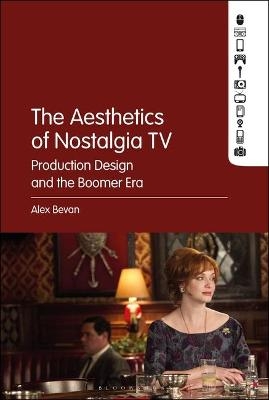
The Aesthetics of Nostalgia TV
Bloomsbury Academic USA (Verlag)
978-1-5013-6809-7 (ISBN)
Alex Bevan is a Lecturer in Digital Media at the School of Communication and Arts at the University of Queensland in Brisbane, Australia. Her articles have appeared in Cinema Journal, Adaptation and Television and New Media.
Acknowledgements
Preface
Introduction: Touring the Mad Men Set
Interventions in Production Studies
Devising Authorship
Deconstructing the “Text”
Methodological Interventions
Interventions in Memory Studies
Quality Television and Identity Politics
Chapter Breakdown
Part I: Sets
Chapter One: TV Suburbia and Remembering the Sitcom Set
Introduction: The Nostalgia of Recycled Sets
The Sitcom Studio Lot as Living Archive
My Universal Studio Tour and Narrativizing Fantastic Space Conclusion: Industry Nostalgia and the Sitcom Home
Chapter Two: Office Sets and Nostalgic Modernism in the TV Workplace
Introduction: Differences at Work
What the Modernist Office Set Says About Fantasies of Self and Home
The Politics of Taste in Television Production Design’s Reinventions of Modernism
“Bad Taste” and Gender Identity in the Corporate Modernist Set The Industry Background of Reinventing the Boomer Years
Conclusion: Retro Modernism as Shorthand
Part II: Props
Chapter Three: Prop Talk: A Behind the Scenes Look
Introduction: The Importance of Props
Press About Props
The Popular Legitimation of the Prop Industry and Digital Tensions
When Props Become the Whole Story: Historical Time Travel Conclusion: Digital Era Prop Talk
Chapter Four: Prop Stories: Media Props in Narrative Context
Introduction: Props Tell Stories
The Polaroid as Narrative Device
The Home Movie as Historical Conduit
The Nostalgic Anticipation of Digitality in Mad Men
Old Media Props in Other Period Dramas
Conclusion: The Privileges of Time Travel
Part III: Costumes
Chapter Five: Making, Renting, and Telling Histories Through Costume
Introduction: Clothes Tell Stories
Costume Design as Gender Historian
Telling History By Disrobing
From the Maker’s Perspective
Other Examples of Television Fashion Doing Gender History
Conclusion: When Words Fails, Costumes Do Not
Chapter Six: Costume Countermemory: Marginalized Television Voices and Chicana Retro
Introduction: Questioning Nostalgia’s Whiteness
The Postwar “New Look” and Nostalgia TV
Ugly Betty’s Aesthetic, Narrative, and Industrial Diaspora Clashing Vintage Patterns and “Bad” Taste
The Western Costume Company and Costume Bricolage
Bad Taste in Nostalgic Costume Design
Conclusion: How Far We’ve Come?
Conclusion: Nostalgic Failure
When Nostalgia Goes Bad: The Playboy Club, Aquarius, and Pam Am
Draper Fatigue
Nostalgia in 3D
Bibliography
Index
| Erscheinungsdatum | 21.08.2020 |
|---|---|
| Zusatzinfo | 29 bw illus |
| Verlagsort | New York |
| Sprache | englisch |
| Maße | 152 x 229 mm |
| Gewicht | 358 g |
| Themenwelt | Kunst / Musik / Theater ► Film / TV |
| Geisteswissenschaften ► Psychologie ► Allgemeine Psychologie | |
| Geisteswissenschaften ► Psychologie ► Biopsychologie / Neurowissenschaften | |
| Geisteswissenschaften ► Psychologie ► Verhaltenstherapie | |
| ISBN-10 | 1-5013-6809-5 / 1501368095 |
| ISBN-13 | 978-1-5013-6809-7 / 9781501368097 |
| Zustand | Neuware |
| Informationen gemäß Produktsicherheitsverordnung (GPSR) | |
| Haben Sie eine Frage zum Produkt? |
aus dem Bereich


